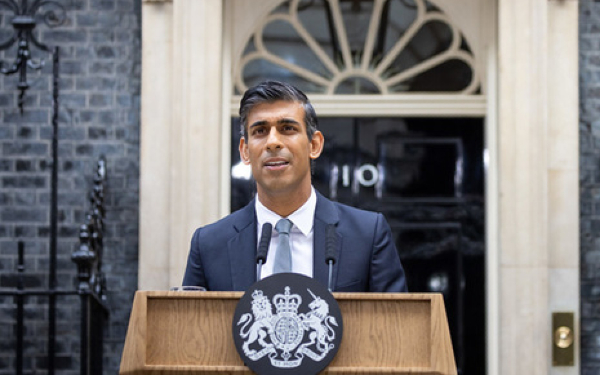
Rishi Sunak has called a general election for 4 July.
The prime minister made the announcement in a statement in Downing Street today, firing the starting gun on a six-week campaign.
The news comes with the Labour Party roughly 20 percentage points ahead in the polls (source: BBC), strongly suggesting they will end 14 years of Conservative rule on polling day.
Announcing the election, Sunak referenced global security, defence spending, NHS investment, funding for local transport, schools standards, welfare reform, immigration levels, sending asylum seekers to Rwanda and his plans to prevent future generations from buying cigarettes.
However, there was no mention of social care, and the two parties’ plans for the sector in England* remain thin despite many pressing issues facing the sector.
Labour’s plans for social care
Labour is committed to the introduction of a ‘national care service’ for adults’ services over the next decade, but what this means in practice remains unclear.
Its main policy for the short-term is the development of a fair pay agreement for staff working in adult social care to improve pay and conditions across the sector, in order to boost recruitment and retention.
Both parties are committed to legislating to reform the Mental Health Act 1983. The Conservatives have failed to bring forward a bill to do so during this Parliament, despite having committed to reform the MHA in their 2019 manifesto and brought forward draft legislation in 2022.
Social care left unreformed
Their 2019 manifesto also committed the party to building a “cross-party consensus” for reforming adult social care to “give every person the dignity and security that they deserve” and “ensure that nobody needing care should be forced to sell their home to pay for it”.
The government’s chosen vehicle to deliver this was the adult social care charging reforms legislated for under the Care Act 2014 but left on the shelf by the Theresa May government.
These included capping people’s lifetime personal care costs at £86,000 and raising the upper asset threshold, below which people with unmet eligible needs are entitled to council-funded care, from £23,250 to £100,000.
However, with the reforms slated for implementation in October 2023, the government announced a two-year delay in 2022 in order to funnel the earmarked resource into day-to-day social care services.
The government does not appear to have progressed work to implement the scheme in October 2025, so deciding whether to take it forward will now be a decision for the next government, of whatever stripe.
Labour has said it is committed to the charging reforms, but has not set out it will pay for them.
Unfinished children’s reforms
The Conservatives have made more progress on their key 2019 election pledge for children’s services – “to review the care system to make sure that all care placements and settings are providing children and young adults with the support they need”.
What followed was the Independent Review of Children’s Social Care, led by Frontline founder Josh MacAlister. This reported in 2022, advocating for a shift from intervening in families’ lives at points of crisis to supporting them earlier, to enable many more children to stay with their parents and thrive.
The Department for Education adopted many of the proposals in its Stable Homes, Built on Love strategy, published last year. But much of this reform agenda is either at the testing stage or is yet to be implemented, including:
- Family help: creating family help services, merging existing child in need and targeted early help provision, is the centrepiece of the reforms and is designed to fulfil MacAlister’s vision of better – and earlier – support for families. This has been tested in three ‘families first for children pathfinder’ areas since last year, with a further seven now coming on stream. But there is no plan as yet for wider implementation.
- Lead child protection practitioners: alongside family help, the pathfinders are also testing a new approach to child protection, involving giving case responsibility to specialist social workers – lead child protection practitioners – working alongside fellow experts in the police and health.
- Agency social work rules: rules curbing councils’ use of children’s social work locums are currently due to come into force this summer, with implementation taking place in stages up to next spring. This is dependent on the government issuing finalised statutory guidance on the rules and it is not clear whether this will be published before polling day.
- The early career framework (ECF): the five-year ECF is designed to provide social work graduates who start working in children’s services with improved support. It is currently being developed with the help of eight authorities, with implementation due in 2026. Taking this forward will be a decision for the next government.
- Regional care co-operatives (RCCs): RCCs are designed to take over responsibility for commissioning care placements from their member local authorities, in order to give the state greater control over the market to ensure sufficient suitable placements for children in care. The government was hoping to test these in two pathfinder areas but has not selected them as yet, meaning the next government will need to start from scratch or drop the idea.
Labour’s position on the reforms is unclear. However, chief social worker for children Isabelle Trowler has predicted that, whatever the election outcome, the agenda, in broad terms, will continue.
What will happen to the Liberty Protection Safeguards?
Another piece of unfinished business from the last five years is the Liberty Protection Safeguards (LPS), whose implementation the government shelved last year.
The LPS was designed to provide a more streamlined alternative to the Deprivation of Liberty Safeguards (DoLS) and the use of Court of Protection orders to authorise the deprivation of liberty of people for the purposes of their care and treatment.
The government has largely disbanded the policy team that worked on the LPS, suggesting that work has not been taking place to prepare for its post-election implementation since last year’s announcement on the policy’s delay.
Meanwhile, Labour has not commented on whether it will implement a reform that it opposed during the passage of the relevant legislation, the Mental Capacity (Amendment) Act 2019.
This leaves councils dealing with huge DoLS caseloads that mean many thousands of people are being deprived of their liberty unlawfully.
The parlous state of council finances
Whether or not these reforms take place or progress, many councils will not be able to escape the parlous state of their finances and the implications of this for their ability to fulfil their social care duties and ensure good services to their communities. Some sobering recent statistics include that:
- One in nine councils were granted emergency government support this year to help them meet their legal obligations to balance their budgets.
- Councils would need an extra £5.4bn this year to meet adult social care demand and cover the full costs of care, according to think-tank the Health Foundation.
- The cost for authorities of funding this year’s 10% increase in the national living wage for the adult social care sector is £1.6bn, according to the Local Government Association (LGA).
- The 41 county authorities alone were expecting to overspend their children’s services budgets by £319m in 2023-24, chiefly because of the rising cost of care placements, according to a County Councils Network survey.
- English councils as a whole were expected to have overspent their £4.7bn care placements budget by 14% £680m in 2023-24, followed by a similar overspend the previous year, according to the LGA.
Public spending question marks
However, neither party appears to have an answer to these challenges as the election campaign gets underway.
Both are hemmed in by their shared fiscal rule to get public sector debt falling as a percentage of national income by the fifth year of rolling economic forecasts (source: UK Parliament).
To meet this, the current government has pencilled in average public spending rises of just 1% a year in real terms from 2025-26 to 2028-29.
According to the Institute for Fiscal Studies, the NHS, defence, overseas aid and childcare are likely to get more generous settlements than this, implying cuts of 3.4% a year on average in real terms to other services, including local government and, therefore, social care.
At the same time, neither party has indicated any intention to raise taxes to reduce or reverse potential cuts to public spending.
The Conservatives are tipped to offer further tax cuts beyond the reduction of four percentage points in employee national insurance contributions made this year.
Meanwhile, Labour has pledged relatively small and specific tax rises, such as its promise to levy VAT on private schools to fund state education.
The parties’ platforms on social care – and how far they engage with these and the other issues facing the sector – will not be revealed until they publish their manifestos next month. It is to be hoped that these provide answers to at least some of these questions.
*As social care is a devolved issue, the election will only directly affect its provision in England.






 Bournemouth, Christchurch and Poole
Bournemouth, Christchurch and Poole  Hampshire County Council
Hampshire County Council  Oxfordshire County Council
Oxfordshire County Council  South Gloucestershire Council
South Gloucestershire Council  Wokingham Borough Council
Wokingham Borough Council  Webinar: building a practice framework with the influence of practitioner voice
Webinar: building a practice framework with the influence of practitioner voice  ‘They don’t have to retell their story’: building long-lasting relationships with children and young people
‘They don’t have to retell their story’: building long-lasting relationships with children and young people  Podcast: returning to social work after becoming a first-time parent
Podcast: returning to social work after becoming a first-time parent  How managers are inspiring social workers to progress in their careers
How managers are inspiring social workers to progress in their careers  Workforce Insights – showcasing a selection of the sector’s top recruiters
Workforce Insights – showcasing a selection of the sector’s top recruiters  Unlocking independence: how ASDAN gives care leavers choice and control over their future
Unlocking independence: how ASDAN gives care leavers choice and control over their future 

 Facebook
Facebook X
X LinkedIn
LinkedIn Instagram
Instagram
This is a great post highlighting the issues with social care investment. LAs are often in dire financial difficulty, which only darkens the pathway to providing quality care. Agencies are often overlooked for their higher cost, and LAs prefer cost over quality of care, and this is based on firsthand experience.
When will the Government realise that social care is a fundamental building block for a more rounded collaboration between social care and the NHS? With equal investment in both social care and the NHS, will the issues be fixed at ground level, and will hospital admission rates, bed blocking, etc. be fundamentally reduced.
There is no such thing as bed blocking. Extended stays are due to our failures to provide services that enable people to live their lives. It’s our failures, it’s our buck passing, it’s our professional silos that prevent people leaving with the support they require to be safe. We are the problem, social workers and all, not people in need. Time for us to be honest about our deficiencies.
I admire this kind of honesty. You’re the first person I’ve come across, who actually has the bravery to speak up, and tell it like it actually is. 🙂
The statements made by both Labour and Conservatives show how little they have any understanding, statements around improving pay and conditions for social care staff to improve recruitment and retention (to reduce the need for International recruitment and as such legal migration) but absolutely no clarity of how this would be achieved and most importantly how it would be funded! It makes me really cross!